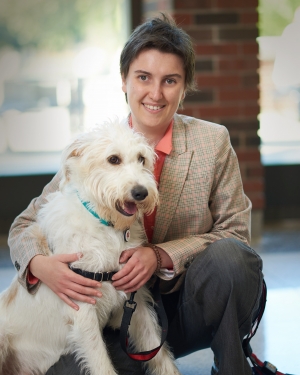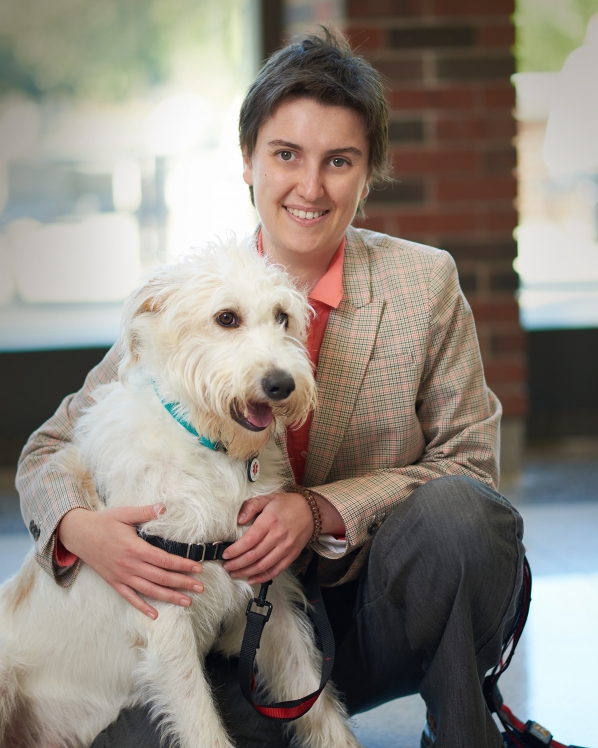Honors College alum Rebecca-Eli Long ‘16 ‘20 has been awarded the prestigious Wenner-Gren Dissertation Fieldwork Grant for their research at Purdue University in West Lafayette, Indiana. Long began work towards dual Doctorate of Philosophy degrees in anthropology and gerontology, also with a concentration in applied anthropology at Purdue in August of 2020. Long’s intended areas of focus align directly with the research areas covered by the Department of Anthropology, including public engagement, science and technology studies, and social justice.
The Dissertation Fieldwork Grant is one of the most prestigious grants in the field of anthropology, and the Wenner-Gren Foundation is a leader in providing support for research that advances anthropological knowledge. As stated on the Wenner-Gren website, “Our goal is to support vibrant and significant work that furthers our understanding of what it means to be human.” Long is embarking upon just that kind of cutting-edge research with their dissertation that “examines autistic adults’ interests and passions to explore how autistic people create meaning around things that matter to them.” Long highlights the “ableist violence” resulting from biomedical approaches that seek to cure autism and “calls into question ideas that are at the core of who is or is not human.” With this research they “challenge social injustices, while also contributing to understandings of neurodiversity, ableism, the life course, and possible futures for humanity.” They further explained,
“I think depictions of autism as a tragic, joyless existence are inaccurate and harmful. I hope to tell new stories of autism by exploring the things that matter to autistic people. More specifically, I situate my intense interest in knitting within my positionality as an autistic anthropologist, and I use knitting to materialize autistic interests as a way to examine both what is meaningful to autistic adults in the context of the US autistic self-advocacy movement, as well as to argue that autistic people can in fact, create meaning and change cultural understandings of autism as a meaningless existence.”
The Wenner-Gren Dissertation Research Grant will provide funding for one year, officially beginning in the summer of 2023. Long will be conducting multimodal ethnographic research including creative methodologies shaped by their own special interest—knitting. Their research includes interviews with autistic self-advocates, online knitting circles with autistic crafters, and creating a series of knitted artworks. Long shared that “as someone who does fieldwork that is non-traditional in terms of research methods, I see getting the Wenner-Gren as an exciting sign that anthropology is willing to consider what different sorts of ‘fieldwork’ can look like.” For more on Long’s use of knitting as a way to document their continued human existence and survival through trauma, read “Security Blanket: Neuroqueer Knitting in Pandemic Times” published in the Fall 2022 Issue of Lateral: Journal of the Cultural Studies Association.
For their dissertation, Long is working with Dr. Sherylyn Briller, professor in the Department of Anthropology. Their additional committee members include: Drs. Risa Cromer and Kali Rubaii, both assistant professors in the Department of Anthropology, and Dr. Maren Linett, director of the Critical Disabilities Studies program. Long defended their dissertation research proposal in the Spring of 2022 and is on-track to complete coursework in the Spring 2023 semester. In addition to the Wenner-Gren, their dissertation research has been funded by the Center for Craftand the Society for Visual Anthropology, as well as Purdue University.
Long graduated with University Honors completing their Bachelor of Arts degree in December of 2016 with double majors in art and anthropology. They also completed departmental honors in both majors, each with distinct thesis requirements. For their Honors thesis, "Seeing India: A Hyperreal Yoga Fantasy," Long worked with Dr. Dana Powell, associate professor in the Department of Anthropology, and Dr. Heather Waldroup, associate director of the Honors College and professor in the Department of Art, as thesis directors. Dr. Christina Verano Sornito, assistant professor in the Department of Anthropology, and Dr. Sushmita Chatterjee, former associate professor and director of the Gender, Women’s, and Sexuality Studies program in the Department of Interdisciplinary Studies served as additional readers.
Long shared that their work in the Honors College at App State prepared them for their success in graduate school. They shared,
“My Honors work put me on track for strong research and writing skills. I still remember all of the Honors seminars I took; they each offered insight into how rich different areas of study can be, while also preparing me for the seminar format of graduate coursework. Getting to design and complete my own research project gave me so much more confidence in my academic ability and taught me so much that wasn’t otherwise covered in my program of study. While of course the Honors thesis stands out, Honors also positioned me to work closely alongside professors to learn more about their research and have a closer mentoring relationship than I might have otherwise. Looking back, I think that was at least as important as my finished thesis project. It was these relationships that meant I had a lot of support in thinking about the next steps after finishing my thesis and applying to graduate school.”
Long completed the Master of Arts degree in Appalachian Studies with a graduate certificate in Aging, Health, and Society in May 2020. For their master’s thesis, "Claiming Disability in Appalachia" Long worked with Dr. Julie Shepherd-Powell, assistant professor and graduate program director in the Appalachian Studies program, as their thesis chairperson. Dr. Bruce Stewart, professor in the Department of History, Dr. Bradley Nash, professor in the Department of Sociology, and Dr. Eric Karchmer, former assistant professor in the Department of Anthropology, served as additional committee members.
While completing their master’s degree, Long worked with Dr. Albert Stabler, then assistant professor in the Department of Art at App State to conduct research into the experiences of disabled people at the university. Long and Stabler created the Able-achian project, “which took shape out of the authors’ own experiences of academic ableism.” In their resulting article, “This is NOT Okay:” Building a creative collective against academic ableism, published on June 9, 2021 in the Journal of Curriculum and Pedagogy by Routledge online, Long and Stabler highlight how “disabled university students, as well as disabled faculty, staff and other community members, face an array of challenges in conducting their studies and in navigating their daily lives.”
Long shared that “returning to App State for my M.A., I was interested in how place intersected with experiences of disability. Because of the breadth of my different research experiences, now I tell people that I’m interested in studying how ableism shapes people’s lives across geographic and disciplinary contexts, as well as creative strategies to challenge ableism.” With this Wenner-Gren support for Long’s significant research into the emerging area of disability anthropology of neurodivergence, they will be able to include more participants in their research study. As Long shared, that means “I’ll be able to hear more diverse perspectives than I would without it. I think it’s important to make sure that my research reflects the diversity of autistic people and multiple perspectives.”
Long emphasized how their multidisciplinary work and various academic paths have shaped their current research directions. They stated, “When approaching my dissertation, it was really gratifying to see how my double major of anthropology and art both influenced the work I am doing now. I’ve had a longstanding interest in how issues of visual representation reflect cultural ideas. Though I didn’t study disability specifically during undergrad, I was certainly interested in issues of embodiment and wellness. At the same time, I was also coming to understand myself as disabled, and eventually encountered disability studies, which helped me make sense of my experiences.” Reflecting on this, Long offered the following advice to current Honors students at App State: “It’s okay if you’re not 100% sure how all of the different pieces of your education fit together. They might make more sense in hindsight, and even if they don’t, you still got to pursue what interested you!”
Top photo features Rebecca-Eli Long with their service dog Tizzy. Photo submitted.

